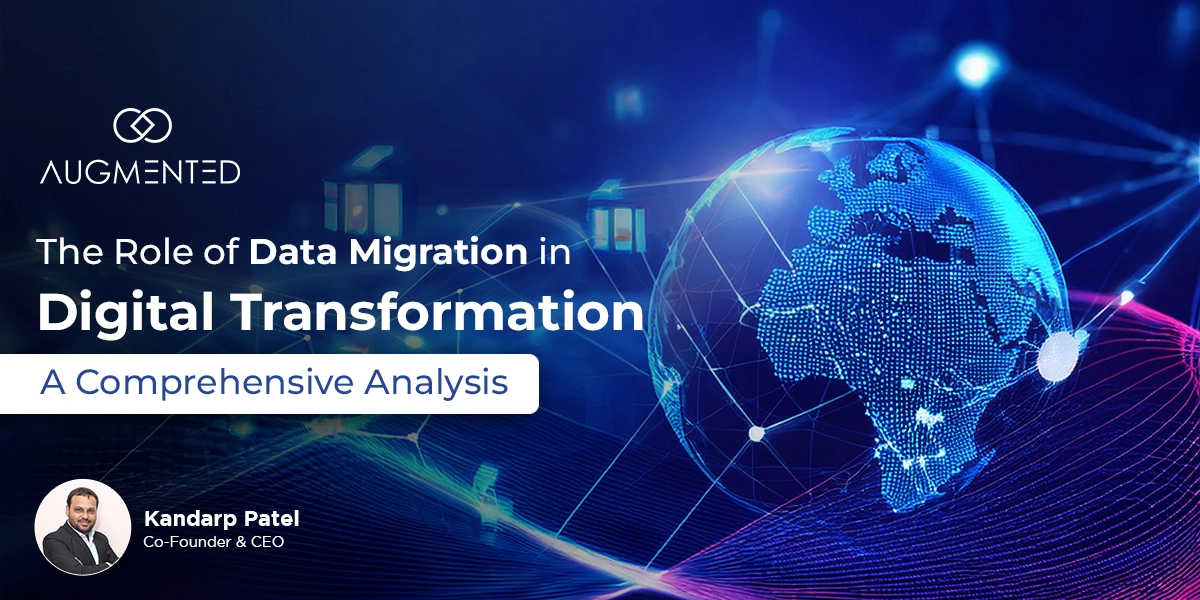Nurturing digital transformation, but not sure what’s stumbling your growth? You have the numbers, all the crucial data, and the ambition to grow. Yet, something is holding you back.
Is it outdated systems?
Is it data inconsistency?
Is it the fear of data loss?
Is it Data Migration? As difficult as it may seem, data migration is key to a successful digital transformation. It allows you to stay competitive, adapt to evolving markets and grow with your customers.
Want to know how?
Read the blog to discover how data migration services can be your step toward the next big digital phase.
How is Data Shaping the Digital Transformation Landscape?
With innovation never taking a u-turn, businesses are obsessed with digital transformation. Every business worldwide wants to leverage the power of AI, big data and machine learning.
Moreover, companies are pouring billions into building data lakes and moving to the cloud. However, these investments still fail to achieve their digital transformation goals because they overlook poor data quality.
So, how do you ensure that data defines your digital journey and becomes a strategic asset for your digital transformation? Here’s how:
- Make Data-Driven Decisions: Data and digital transformation go hand in hand. Make data-driven digital transformations.
- Data for Innovation: Leverage data analytics to be at the forefront of innovations.
- Data-Driven Customer Experience: Understand your customers with data. Satisfy their diverse expectations by building data-driven digital solutions.
- Business Process Automation with Data: Let data help you identify the right task to automate. Data also help you adapt to the learning curve of the new automated systems.
So, to thrive in the digital era, prioritizing data transformation over digital transformation is crucial. Data transformation serves as the foundation for your digital transformation. Therefore, meticulously migrate your data with seamless data migration services.
Role of Data Migration Services in Digital Transformation
Want to reap digital transformation benefits to the fullest? Then, make data your biggest asset. Data Management, Utilization, and Migration lie at the heart of digital transformation.
But for many, data migration is merely ‘lifting and shifting’ their data from one place to another. Here, data becomes the sole reason for data loss, corruption, or project failures.
So, do you want to nurture digital transformation for long-term success? Then, comprehend the true meaning of data migration services and their role in transforming your digital journey.
What is Data Migration?
Data migration is a process of seamlessly moving or transferring data from one place to another. It usually involves migrating data from legacy systems to new, modern systems. Moving data to the cloud is one such example of data migration.
Moving from in-house or private data centers to a public cloud platform includes the following steps:
- Data migration planning and assessing
- Backing up your data
- Choosing the right migration techniques
- Preparing the new data environment
- Performing the migration
- Data migration testing and optimizing
However, before you hit the ‘migration’ button, it is crucial to have a data migration strategy. Data migration should feel like magic. But how does data migration play a key role in digital transformation?
Let’s have a look.
Why do You need Data Migration for Digital Transformation?
Data migration is the pillar of data transformation. Whether you are building the next generation of robots or simply updating your sales reports, you need data. Legacy systems and siloed data are the relics of the past and won’t support your digital future.
You wouldn’t want to base your digital future on a shaky foundation? Right? You need data migration for a data-driven future for the same reasons. Here are a few key drivers of data migration in digital transformation:
1. Cloud Adoption
Businesses are rapidly adopting cloud-based infrastructures and modernizing their outdated on-premise or legacy systems. Thus, a safe data migration ensures that your data is transferred seamlessly to the cloud, giving you unrivaled flexibility, scalability and cost-efficiency.
2. Legacy System Upgrade
Outdated legacy systems pose hurdles to modernizing businesses. Their limited capabilities and obsolete infrastructure prevent businesses from adopting new digital tools. Thus, you need data migration services to gain valuable insights from your data, which can lead to successful digital transformation.
3. Business Expansions and Mergers
Businesses expanding into new markets or undergoing mergers often combine data from different systems. Moving data into a single format makes it easier for them to make informed decisions and run their businesses smoothly.
4. Compliance and Data Governance
Regulatory requirements and data privacy need proper data management practices. Data migration ensures secure data transfer, reducing risks like data breaches and non-compliance penalties.
The benefits of data migration for digital transformation are many, from migrating customer data to CRM to modernizing core business processes with ERP systems. It serves as a blueprint for digital success for industries worldwide.
What are Digital Transformation Benefits?
Want to reshape the way your business operates? Then, leverage the benefits of digital transformation. Save costs and increase your overall productivity, apart from many other digital transformation benefits.
Do you know that global digital transformation spending is estimated to reach $3.9 trillion by 2027? So ready to transform your business with digital transformation? Dig in to read the top 5 digital transformation benefits.
1. Improved Business Processes
Digital transformation helps boost business performance by automating repetitive tasks, optimizing workflows and integrating advanced technologies like AI. This leads to:
- Faster and more accurate decision-making
- Improved collaborations
- Better resource management
- Better communications
- Seamless customer interactions
- Reduced human errors
- Informed-decision making
- Increased productivity
- Cost savings
Thus, digital transformation helps you develop a more agile, responsive, customer-centric business model, ultimately thriving your business in dynamic markets.
2. Better Productivity
Digital transformations speed up processes and streamline operations, thus providing you with increased efficiency and productivity.
Breakthrough technologies, like robotic process automation and AI, outperform human skills in speed and accuracy. Processes like data processing and analysis collect and analyze data in ways that far exceed human capabilities.
Thus, advanced technologies empower workers to make faster and more informed decisions.
Moreover, a McKinsey report predicts that more than 50% of current tasks could be automated by 2060. And by 2040, Generative AI could increase annual labor productivity from 0.1% to 0.6%.
3. Constant Communication
Instant messaging and chatbots enable real-time communication across global teams and customers. Digital transformation enhances information sharing and project collaborations by breaking down geographical barriers.
Moreover, CRM (Customer relationship management) platforms and social media give a personal touch to your customers. Transparent communication fosters an informed and engaged workforce, leading to better decision-making and stronger business relationships.
4. Enhanced Customer Expectations
With digital transformations, your customers get personalized, efficient, and seamless experiences.
- Advanced analytics and AI help businesses analyze and predict their customers’ needs.
- Mobile applications and chatbots provide 24/7 and 365-day support to all the customers on the go.
- You can track all your customer data in real-time and effortlessly provide solutions.
This stress-free process, resulting from digital transformation, creates a responsive and customer-centric model, raising the standard of your service and fostering loyalty.
5. Security
With increasing digitization, the number of cyberattacks has increased equally. However, digital transformation helps enhance cybersecurity measures with advanced technologies.
- Automated security tools identify and mitigate potential threats, such as AI-driven threat detections and response systems.
- Cloud-based security solutions offer robust, scalable protection and constant updates against malicious activities.
- Enhanced encryption, multi-factor authentications, and secure access controls safeguard your sensitive information.
- Real-time monitoring allows immediate action on suspicious activities.
- Comprehensive security frameworks and regular audits ensure industry-standard compliance.
Thus, digital transformations reduce the risk of security breaches, helping you maintain trust in digital infrastructure.
Conclusion
So, data migration is essential for successful digital transformations, serving as the cornerstone of your digital future.
Looking to boost your ROI, optimize processes, and transition into a digital powerhouse? Get in touch with Augmented Systems. We won’t break the bank but provide cost-effective data migration solutions.


